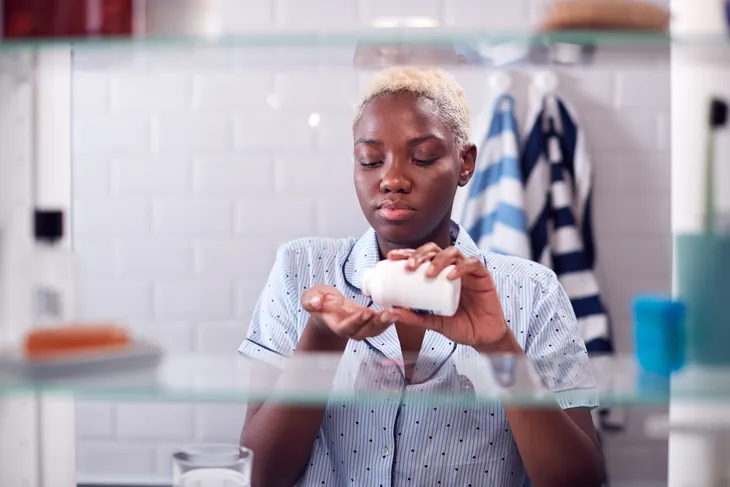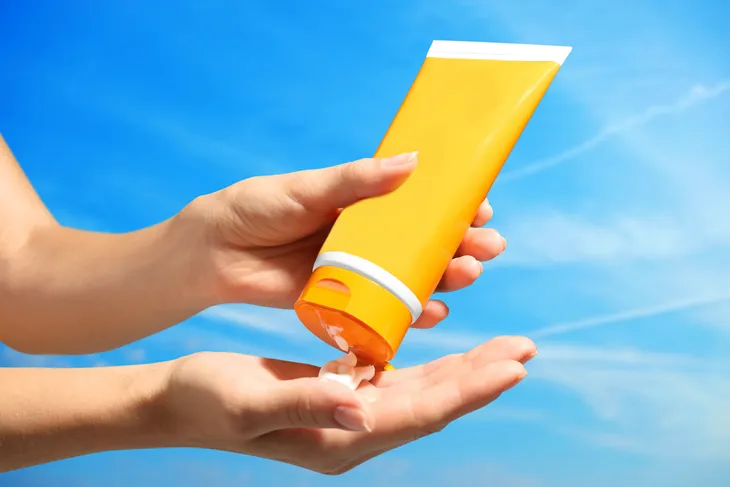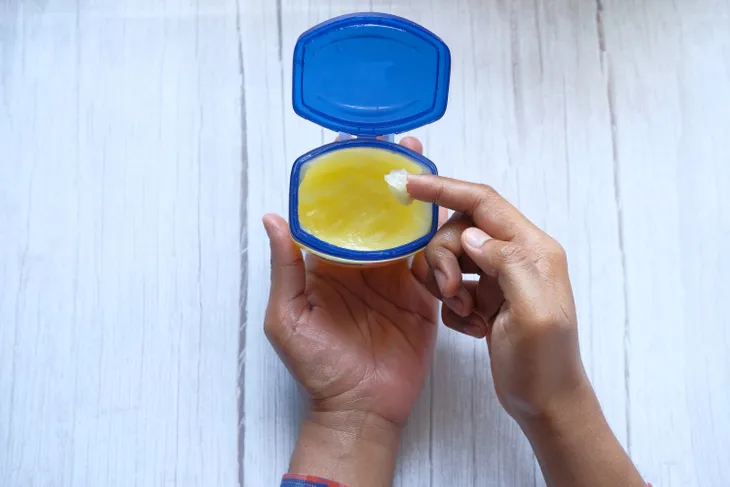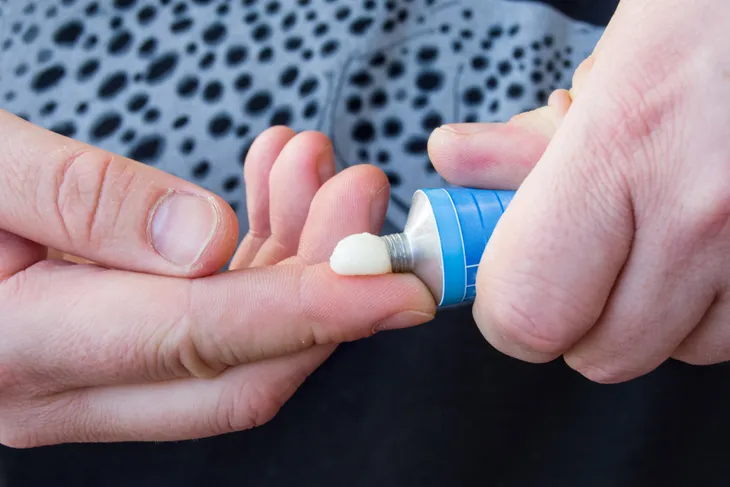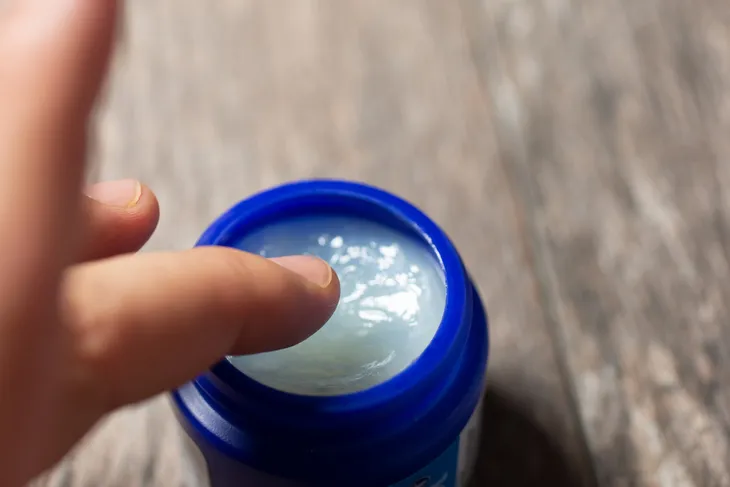- Bumps, bruises, scrapes, and illnesses happen when you least expect them. This is why it’s important to keep your medicine cabinet stocked with the right medical essentials.
- To save time and money, you should first take a comprehensive inventory of the things you already have, and throw out expired products.
- Medicine cabinet essentials include a digital thermometer, OTC medications, cough medicine, sunscreen, bandages, and assorted ointments.
You never know when an emergency might strike. Bumps, bruises, scrapes, and illnesses happen when you least expect them. But by being prepared with a stockpile of at-home medical essentials, you can usually take them all in stride. You don’t have to rush to the pharmacy every time some unforeseen illness strikes your household. In fact, with one quick trip to the pharmacy, you can be prepared for just about any moderate illness or injury the world throws your way.
Step 1: Take Stock
There’s no sense running out to the pharmacy until you’ve taken a comprehensive inventory of the things you already have. It sounds obvious, but sometimes stating the obvious can save you a lot of money and time.
Dedicate as much time as you can to assess your current stockpile. Note what you have, note what you think you may need, and throw out the old stuff too. Over-the-counter medications, sunscreen, and topical rubs all have best-before dates too, which is why you can’t assume that everything in your medicine cabinet is always safe to use.
Digital Thermometer
A functioning digital thermometer that you know how to use and read is a medicine cabinet essential. They’re widely available online and at pharmacies and are incredibly accurate. A working thermometer is certainly more reliable than having a loved one touch your forehead.
It’s recommended that you seek medical attention to address any temperature reading that runs higher than 103 ºF. An under the tongue digital thermometer is all you’ll likely need, though rectal thermometers are the recommended route to take when assessing the fever of children under the age of 3.
Over-The-Counter Pain Relievers
We’ve all grown up around bottles of over-the-counter pain relievers. Deciding on which branded bottle you should reach for is a matter of familiarizing yourself with the effects of the active ingredients they contain.
Some are good for headaches and sprains, while others have specific anti-inflammatory properties. Most of the major brands and their no-name alternatives serve to manage a high fever. Either way, stocking up on over-the-counter pain relievers, and ditching any expired ones you may already have, is always a good idea.
Sunscreen
Covering yourself with sunscreen every day that you plan on being outside is so much more important than most may think. It protects the appearance and health of your skin regardless of your age and lowers your skin cancer risk.
Regular application of sunscreen should be a major component of your morning routine. Especially if you work outdoors. But you must have some on hand all the time to apply it to your exposed skin all the time. So don’t skimp on the SPF 30 sunscreen. Your skin will thank you.
Bandages
Unless you live in a vacuum, cuts and scrapes are going to happen eventually too. If the wound looks deep, is more than half an inch long, or won’t stop bleeding, then you should get a doctor to look at it. For minor wounds, a properly placed bandage or two will usually do the trick.
It’s impossible to prepare for all potential injuries. But a box of adhesive bandages in assorted sizes, a box of large gauze pads, as well as some butterfly bandages should do the trick. Liquid bandages can be an effective way to seal off cuts in inconvenient locations.
Petroleum Jelly
A combination of mineral oils and waxes, petroleum jelly is the hardest working component of most people’s medicine cabinets. The stuff’s been used since the late 1800s to heal wounds and burns, but it can actually do even more than that. Petroleum jelly can moisturize your skin, remove eye makeup, and even prevent diaper rash.
Some people are allergic to it, and it should never be taken internally, but petroleum jelly should be a consistent component of every well-stocked medicine cabinet in America.
Hydrogen Peroxide
Of all the ways to clean a cut, applying a few capfuls of hydrogen peroxide usually does the trick. This mild antiseptic uses the power of oxygen to remove dead skin and clean the desired area.
It can be used on minor cuts, scrapes, and burns. It can even be used as a mouth rinse to beat back the symptoms of canker sores and help remove mucus. Keep in mind, hydrogen peroxide should never be swallowed or used to treat deep wounds, serious burns, or animal bites. Nonetheless, it’s still important to have one on hand in your home just in case.
Antibiotic Ointment
Antibiotic ointment is another topical treatment you should consider keeping a running supply of. It’s available without a prescription and is used to prevent and treat minor skin infections from burns, scrapes, and cuts.
It should only ever be used on the affected area of the skin. To use it you must first wash your hands, apply a small amount of the medication on the skin and gently rub it. Once applied, cover the area with a bandage. Antibiotic ointment can be applied up to three times per day.
Mentholated Ointment
Mentholated ointment, better known as Vicks VapoRub, has been around for over 125-years. This popular combination of camphor, eucalyptus oil, menthol and more has been shown to relieve congestion, ease coughing, and soothe sore muscles.
Keeping a container of the stuff in your medicine cabinet can really come in handy during flu season. It’s easy to use too. To enjoy its cough-suppressing properties, simply rub a thick layer of the stuff on your chest and throat and let the menthol-infused vapors reach your nose and mouth.
Antacids
If you’re prone to dealing with digestive issues, consider investing in a bottle of antacids. The regular appearance of heartburn should really be addressed by a medical professional. Having said that, most of us do experience heartburn on occasion.
Antacids can also be used to treat symptoms of acid reflux and indigestion. Antacids come in liquid, tablet, and dissolvable forms too. Picking the right one for your medicine cabinet is usually a matter of personal preference and symptoms. If you have questions on which one may be best for you, don’t be afraid to consult your doctor or pharmacist.
Cough Medicine
Coughs come in all shapes, sizes, and severities. Thankfully over-the-counter cough medicine does too. There are cough syrups crafted to help you sleep, loosen mucus, suppress the cough reflex, and more. They’re incredibly effective too.
Though it may be tough to pre-purchase the perfect cough medicine ahead of time, stocking up on one drowsy and one non-drowsy cough medicine will likely keep you covered. While most coughs do go away on their own, the right cough medicine can help speed up your recovery and help you get some much-needed rest.
The Takeaway
The more you have on hand to treat potential injuries and illnesses the better. It never hurts to be prepared for bad things to happen. In fact, being stocked up on over-the-counter pain medications, bandages, cough medicine, and all the other items we’ve discussed can save you a lot of pain and anguish.
Take stock of what you currently have in your medicine cabinet, make note of things you think you’ll need, and go about acquiring them ASAP. Not only will you be ready when the inevitable strikes, but you’ll also rest easy knowing that your household is prepared for just about anything.



